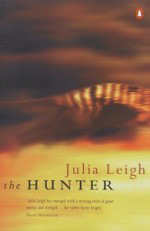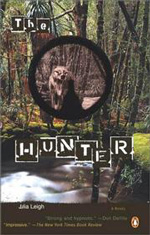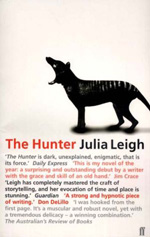
The last known thylacine (Tasmanian tiger) was captured in Tasmania in 1933 and spent its final three years in Hobart Zoo before it died of exposure after being locked out of its shelter one very cold night. However, sightings of this incredible creature have been reported both in Tasmania and on the mainland of Australia as recently as 2006. In 1999 a project was begun to clone the Tasmanian tiger using genetic material from specimens preserved in the early years of the twentieth century.
It is this project to produce a Tasmanian tiger that drives Julia Leigh's protagonist in The Hunter to travel to one of the wildest areas of Tasmania where the latest sighting has been reported. He is the hunter, and he "practises his story", deciding that his name will be Martin David or just simply M, as he pulls into the yard of the little bluestone house where he will make base camp for his forays into the bush.
M is taciturn and incommunicative, withdrawn emotionally and single-mindedly obsessed with the hunt and his prey. He is isolated and has no need for other people. He is the perfect hunter.
M's hunt for the Tasmanian tiger soon becomes an obsession. He spends days on end isolated from the rest of the world with only his thoughts for company. He begins to second-guess the tiger; his thoughts and actions become attuned with her, and finally his obsession consumes him altogether.
When M arrives at the house where he will be staying in between his forays into the bush, he finds a broken family. The father, a ranger whose report on the sighting of the tiger prompted M's mission, has disappeared on the mountain where M will be hunting. The mother is attempting to sleep through her grief with the aid of pills, and the children ("My name is Katherine Sassafrass Milky-Way India Banana Armstrong. You can call me Sass. This is my brother, James Wind Bike Leatherwood Catseye Armstrong. Call him Cat, or Bike") are barely managing the house and themselves. M is reluctantly forced to rely on the unpredictable young Sass to alert the authorities if he does not return on the agreed day; he is disturbed when he realises he will be forced to rely on the children since he considers them "…spies, children, little murderers. And adults, he remembers, were the enemy."
M finds himself becoming attached to this sad, struggling family. He surprises himself by actually considering a life with this lonely woman and two precocious, yet needy children. He is amazed to find that "A feeling of warmth, actual bodily warmth, flushes through his chest…he realises that he, too, will miss her, will miss them, and this feeling doesn't leave him as he drives away".
The Hunter is an uncompromisingly bleak story of obsession and of hope. Leigh's prose is haunting. It is spare and compelling and her ability to draw such vivid pictures with so few words is amazing. The Hunter is, on the surface, a simple story, yet its many layers are moody, bleak and oh so atmospheric. This is a book that will resonate long and loud.
First published in 1999 to much critical acclaim, The Hunter has been reissued to coincide with the release of
a movie based on the novel.

Penguin Australia, paperback, 9780140283518

Penguin, paperback, 9780142000021

Faber and Faber, paperback, 9780571200191
